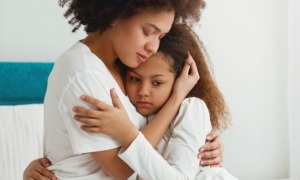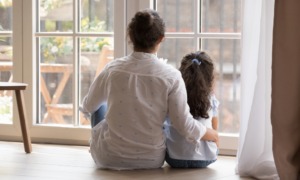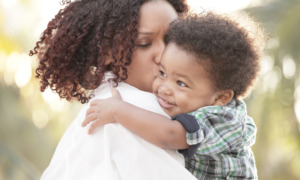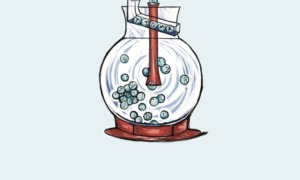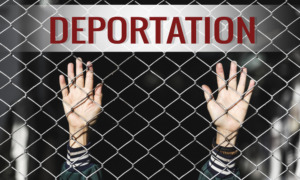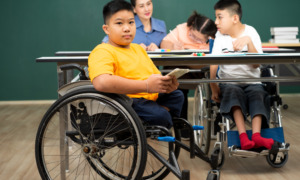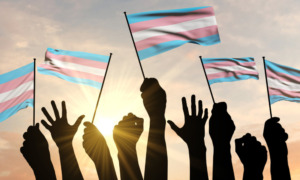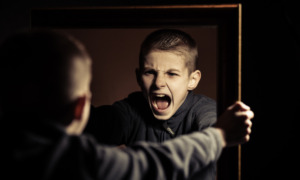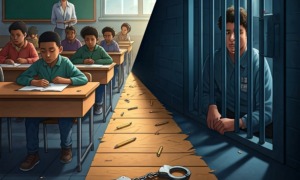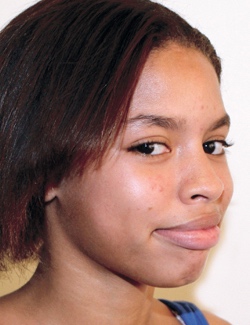 When I was younger I never felt part of a family. I would watch families on Disney Channel — the Tanners from “Full House,” the “Brady Bunch” — and see them happy and united as one, playing games, eating dinner together. Of course there were mishaps, but they were able to get through anything.
When I was younger I never felt part of a family. I would watch families on Disney Channel — the Tanners from “Full House,” the “Brady Bunch” — and see them happy and united as one, playing games, eating dinner together. Of course there were mishaps, but they were able to get through anything.
My mother was a drug user and prostitute, and my father was a gang member, in and out of jail. They lost their rights to me and my brother, and we were adopted when we were very young. The people who adopted us, the Pattersons, abused us and treated us like prisoners. My adoptive mother and father and their biological daughter ate a well-cooked dinner at the table, while my brother and I ate noodles in the basement.
The only time we ate together was on Sundays. My adoptive father was a pastor, and he preached every Sunday. He would point to us during his sermon and say he loved his wife and kids and that we were a strong family. It made me so mad; I knew that he didn’t practice what he preached.
The rest of the week, my brother and I stayed in our room. In the afternoon, we’d watch Disney Channel until our adoptive father came into our room and made us turn our TV to the spiritual channel. He would peek in every few minutes to make sure we were watching the channel, which I found weird and boring. There would be a guy preaching that Jesus is his savior, or a hotline where people called and confessed their sins or people in church “catching the holy ghost.”
One time when I was about 6, after I heard Mr. Patterson go back upstairs, I turned our TV back on Disney channel to watch “Spy Kids.” Normally, when I heard him coming, I quickly changed back to the spiritual channel. But this day, I went to the bathroom and forgot to change the channel first.
My adoptive father told me to get out the bathroom. I got out as quick as possible, and he screamed at me, “What the f-ck did I tell you? Why did you change the channel?” I started to answer, and he said “Shut the f-ck up!”
I began to cry. He said, “Do you want me to give you a reason to cry?” I shook my head no. My adoptive mother came out and asked what was going on. He said, “This dumbass changed the spiritual channel.”
I cried harder because I knew what was about to happen. She looked at me and asked, “Do you just love to get us mad?”
“No,” I said between sobs.
My mother got the belt and my father watched. Swish swish swish went the belt, left to right, hitting my arms, legs, butt, even my face. After they left, I cried quietly, afraid of getting another beating. Beatings like this happened several times a week.
They didn’t ask my brother or me about school. But my brother and I wanted a family, so we still tried to get close to them. One time my brother came home and showed them a good progress report: “Look, I got good grades.” They crumpled it up and threw it at him.
No Rescue
Our biological mother, meanwhile, lived a few blocks away and I would run into her in the neighborhood. She knew the Pattersons beat us, and as a small child, I thought she’d take us out of that house. She would tell me that she’d get me and my brother back. At first I believed her, but by the time I was 7, I knew she wasn’t going to rescue us. That didn’t mean I accepted it: I was full of rage, even as I hoped for her love and care.
When I was 11, my adoptive mother died, and I went into care. I thought this was my chance at a family who laughed together and showed each other love. I imagined family talks about how our days went and going out as a group to have a fun time. I imagined crying to someone who would wipe my tears and say, “I’m here for you.” I pictured telling a kind mother and father that I got an award at school, and they’d hug me and say, “I’m proud of you.”
Instead, I was moved from home to home – 16 in two years. None of these foster parents were like the ones I dreamed of. One tried to slam my hand in the door because I didn’t wash her dishes. Another fed me Oodles of Noodles for every lunch and dinner. One caught me smoking weed and locked me out of the house and demanded the agency take me back immediately.
Each time I got moved, I felt worthless. I cried a lot.
In the 16th foster home, we went out to the movies and sometimes out to eat together as a family. It was fun. My foster mother even brought up adopting me. But my foster sister threw out my poems and clothes, so I beat her up. Instead of adopting me, my foster mom put me in the psych ward.
Could This Be a Family?
My life looked as hopeless as it ever had, but my very next placement was with Jenny and Jose Garcia and their 10 foster, adoptive, and biological children and grandchildren.
Jenny, two of her daughters, and a grandchild picked me up from the hospital. When I first saw Jenny, I thought she was going to be like all the other foster mothers — nice until we weren’t in the eyes of the agency.
I overheard my social worker tell Jenny that I was a “problematic child” and “hard to cope with.” Jenny kept saying, “I want her. I want to try.”
That first night, Ms. Garcia asked me to call her “Ma” and added, “I’m here for you. This is your family now.”
I felt like crying. I had never heard those words.
Then I went upstairs and all the kids were on the PlayStation. I was surprised that they were all sitting together and laughing and having fun. I wasn’t used to that. They asked me if I wanted to play and I said no.
Gigi, who was 9, came up to me and said, “Why are you wearing that? You look like a boy.”
She took me to her room, which she shared with Jenny and José. She had her own little space in there with a bed and a dresser. She asked if I had any girl clothes. I said no. She went into my suitcase and took out a pair of jeans.
“Cut these into shorts.” She seemed to have a teenage mentality, but she was only 9. It was cute. I did what she said.
Then she told me, “Put them on and roll them up.”
I did, and she asked, “You don’t have any girl shirts?”
I looked down. She opened her dresser and took out a tank top and gave it to me, and then she did my hair. She looked at me and said, “That’s better.”
“Why did you do all of that?”
“Because you’re my sister and you looked like sh-t.”
“Wow, That’s Crazy”
We went to the park and played together — all of the kids. At the end of the day, they asked the question I dreaded: “Why are you in foster care?”
I hesitated. The day had been perfect and I didn’t want to ruin it. But I felt some kind of security, so I told them about my mom and dad and a little about the other homes. I tried to be funny like it didn’t bother me. When I talked about the beatings, I acted out how I tried to run away from the belt.
When I got to the end, everyone was like, “Wow that’s crazy.”
“Yeah, I know.”
GiGi said, “Well you don’t have to worry about that here. We’re all family.” The rest nodded in agreement.
Right From Wrong
Now, two years later, it’s even better. Jenny, or Ma, as I call her now, is patient and caring. I have misbehaved and acted out, but she stands by me.
Once I got into a fight at school and got suspended. Ma asked what had happened, and I told her some girl was talking about my family and bumped me.
Ma explained that I shouldn’t put my hands on anybody. I asked her, “So if someone insulted your family and then bumped you, you wouldn’t hit them?”
“No I wouldn’t. I would tell the teacher.”
“Then I’d get laughed at and called p-ssy!”
Jenny said “So what? Why do you care what others think?”
I said “Because it IS p-ssy for me to let someone push me around!”
She got mad and went to her room, and I got mad and went to mine. The next morning we said good morning to each other, and then there was an awkward silence.
I said, “I’m sorry for being rude to you, but I don’t like when people talk reckless to me and then get away with it.”
She said “It’s OK, but you can’t go around hitting people. Now you’re suspended, and she is at school! Losing days at school doesn’t look good on your records.”
I nodded.
She went on: “You are too smart to be doing stuff like that.”
I told her I was sorry and gave her a hug.
I wasn’t used to any of that. Other foster parents didn’t talk to me and explain to me why I shouldn’t do something. They certainly wouldn’t tell me I was smart. One foster parent who ended up sending me back had told me, “I don’t care about the decisions you make as long as they’re not getting me into any trouble.”
Responsibility to Each Other
But my mom cared enough to explain why I was wrong. She even helped me change my perspective of what’s courageous. She explained to me that walking away from a fight or avoiding conflict was actually very strong and mature.
Being connected makes us responsible for each other. Fighting now isn’t only hurting me; it hurts my mom if I ruin my future. It also sets a bad example for my little sister Gigi, who looks up to me. I don’t want to set a bad example and lead her down the wrong path.
It’s not a Disney movie. There are a lot of Garcias living in one house. Many of us were in foster care and haven’t known steady love and support before. Recently my foster sister I got into an argument because she was flirting with my boyfriend. We fought and then I stopped talking to her for a while, even though we shared a bedroom. I could feel the heat and the tension every time I was around her. It didn’t feel right to be angry at her, but my mind was telling me she’d violated me. I decided to listen to my mind instead of my heart and stayed mad.
One night we were in bed, and around midnight she said, “Sis, you awake?”
“Yeah.”
She said “It’s boring,” and I agreed, so we went on the roof and stayed out until the sun rose. In any other foster home, I wouldn’t have talked to her. I’d have ignored her or gotten into a fight.
But it’s different with her. As sisters, we’d shared secrets we hadn’t told anyone else, and we’d cried together. That night on the roof, we laughed at memories we shared at school. We forgave each other.
With the help of my family, my anger and aggression has gone down a lot. I don’t get mad at little things like I did when I was getting abused. The abuse got me angry, partly because it wasn’t fair. If I’m doing all the right things — doing my homework and my chores — why are you hitting me? If I revolted or hit back, I would get another beating. I had no way of protecting myself and no way to control my anger.
Now I’m treated fairly, and my life is more predictable. Having someone to talk to helps me vent and control my emotions, so I am less impulsive. Instead of feeling tense and alone, I feel relieved, safe and welcome knowing my family is there for me. For the first time, I trust the people I live with. I am less angry at the world and happy with what I finally have.
Selena Garcia, 16, wrote this story as a participant at Youth Communication, a New York City-based nonprofit that helps educators engage struggling youth and build their social, emotional and literacy skills. This column was created for Represent, Youth Communication’s magazine written by and for youth in foster care.




